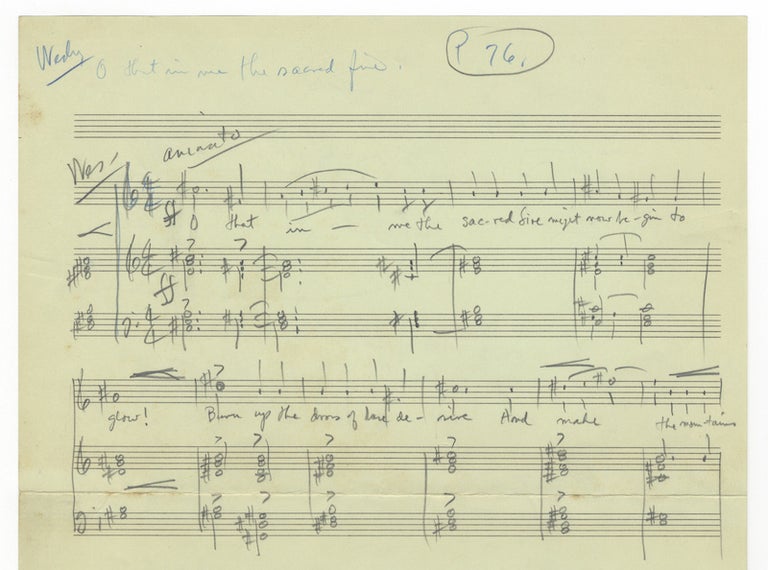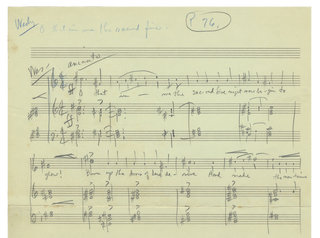The Invisible Fire. Autograph musical sketch and fragment of typed libretto of an oratorio based on the life of John Wesley, with autograph annotations
[?Boulder, Colorado]: November 1, 1957.
Small folio (236 x 332 mm.). One leaf. Notated in pencil on both sides of a leaf of pre-printed 12-stave "Facsimile score paper" issued by Music Print Corporation, Denver.
Most probably associated with p. 76 of the printed piano-vocal score of the work. Three staves per system (Wesley's vocal part, notated in G clef, with text underlay; piano accompaniment). Cue in blue pencil, "Wesley[:] O that in me the sacred fire," and reference, "P. 76," to head of recto. Music ends after 25 measures on lower half of verso, followed by "etc." and reference, "p. 76." Date to foot of recto.
With:
Fragment of libretto of The Invisible Fire. Three typed leaves, stapled, with text to rectos only. Fragment beginning with Part II of the oratorio and ending in the middle of Part V; text of Part I and from the middle of Part V lacking. Autograph note in red pencil to upper left corner of first page: "Send to Cassilly." With numerous autograph annotations in blue pencil indicating division in parts, performing forces, tempi, etc.; the section rendered in the present musical sketch is marked as "enclosed," indicating that the musical sketch and the libretto fragment have been together from the beginning.
A piano-vocal score of The Invisible Fire was published by H.W. Gray in New York in 1957. In 1960 the Methodist Publishing House issued a volume containing the libretto, texts about the work, and numerous related color photographs. The text of the oratorio is by Tom F. Driver (born 1925), with parts adapted from Charles Wesley, John Wesley, and William Cowper.
"The oratorio was commissioned by the National Methodist Student Movement and the Department of Worship and the Arts of the National Council of Churches. It was first performed at the National Methodist Student Conference, on December 31, 1957, with the Kansas City Philharmonic and 200 voice conference choir, Thor Johnson, conducting." From the program of a performance of The Invisible Fire in Bethlehem, Pennsylvania on April 9, 2011.
"Born in Colorado Springs, Effinger studied mathematics at Colorado College (BA 1935), harmony and counterpoint with Frederick Boothroyd (Colorado Springs, 1934–6) and composition with Boulanger in Paris (1939). He played first oboe in the Colorado Springs SO (1934–41) and Denver SO (1937–41). He taught at the Colorado College (1936–41, 1946–8), served as conductor of the 506th US Army Band (1941–5) and taught at the University of Colorado in Boulder (1948–81, composer-in-residence 1981–4), where he became the head of the composition department. He formed a lifelong friendship with Roy Harris, beginning in 1941. In 1954 Effinger patented the ‘Musicwriter’ typewriter, which he manufactured and sold worldwide for 35 years. He also invented the ‘Tempowatch’, the only device that can accurately determine the tempo of music as it is being performed.
"As a composer he was prolific;... among his most popular compositions are his choral works, several of which are large scale and based on sacred subjects, including... The Invisible Fire (1957)... Although he used dissonance, he never abandoned consonant harmonies, referring to his idiom as ‘atonal tonality’. His instrumental works contain lyrical string melodies, lilting woodwind figurations and traditional developmental forms. Many of his works reflect his native Rocky Mountain region in their choice of text, programmatic titles and pastoral style that he associated with western themes." Lawrence Worster in Grove Music Online.
"Cassilly" may well refer to American tenor Richard Cassilly (1927-1998), whose career had taken off in the mid-1950s. In that case, the present sketch might be a replacement, requested by the singer, of the original version as notated on page 76 of the piano-vocal score to which it refers.
Item #25261
Price: $450.00 other currencies


